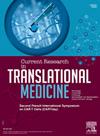Effect and safety of recombinant human thrombopoietin on haematopoietic reconstitution after allogeneic haematopoietic cell transplantation
IF 3.2
4区 医学
Q2 MEDICINE, RESEARCH & EXPERIMENTAL
引用次数: 0
Abstract
Delayed platelet engraftment (DPE) and thrombocytopenia are common complications following myeloablative conditioning in the advanced stage of allogeneic haematopoietic cell transplantation (allo-HCT), and they are associated with transplantation-related mortality and poor prognosis. Therefore, promoting haematopoietic reconstitution after allo-HCT plays a key role in improving patient outcomes. The aim of this retrospective study was to assess the effectiveness and safety of recombinant human thrombopoietin (rhTPO) in promoting haematopoietic reconstruction after allo-HCT. The study included 210 patients who underwent transplantation, with 158 in the rhTPO group and 52 in the control group. Of the total patient population, 120 were males and 90 were females, with a median age of 31 years (range=6 to 59 years). The results showed that the rhTPO group had a median platelet engraftment time that was 14.1 days shorter than that of the control group (14.1 days vs. 21.9 days; P < 0.001). The time for platelet count recovery to 50 × 10^9/L was also shorter in the rhTPO group than in the control group (21.7 days vs. 30.3 days; P < 0.001). Additionally, the granulocyte engraftment time was shorter in the rhTPO group (14.3 days vs. 18.2 days; P < 0.001). There was no significant difference in overall survival (OS) between the rhTPO group and the control group at 2 years after transplantation (77.2% vs. 65.4 %; P = 0.08). Furthermore, there were no significant differences in the amount of platelet transfusions, the rate of platelet engraftment, the rate of DPE, or the incidence of Grade 4 haemorrhage between the groups. Moreover, no adverse reactions were found in the rhTPO group. This study demonstrated that rhTPO administration after allo-HCT effectively reduced the time required for platelet and granulocyte engraftment and was safe.
重组人血小板生成素对异体造血细胞移植后造血重建的影响和安全性。
血小板移植延迟(DPE)和血小板减少症是同种异体造血细胞移植(allo-HCT)晚期髓脱落调理后常见的并发症,与移植相关的死亡率和不良预后有关。因此,促进异基因造血干细胞移植后的造血重建对改善患者预后起着关键作用。这项回顾性研究旨在评估重组人血小板生成素(rhTPO)在促进异体造血干细胞移植后造血重建方面的有效性和安全性。研究包括 210 名接受移植的患者,其中 rhTPO 组 158 人,对照组 52 人。在所有患者中,120人为男性,90人为女性,中位年龄为31岁(范围=6至59岁)。结果显示,rhTPO 组的中位血小板移植时间比对照组短 14.1 天(14.1 天对 21.9 天;P <0.001)。rhTPO 组血小板计数恢复到 50 × 10^9/L 的时间也比对照组短(21.7 天 vs. 30.3 天;P <0.001)。此外,rhTPO 组的粒细胞移植时间也更短(14.3 天 vs. 18.2 天;P < 0.001)。移植后 2 年,rhTPO 组与对照组的总生存率(OS)无明显差异(77.2% 对 65.4%;P = 0.08)。此外,两组间的血小板输注量、血小板移植率、DPE率或4级出血发生率均无明显差异。此外,rhTPO 组未发现任何不良反应。这项研究表明,异体肝移植后使用 rhTPO 能有效缩短血小板和粒细胞移植所需的时间,而且是安全的。
本文章由计算机程序翻译,如有差异,请以英文原文为准。
求助全文
约1分钟内获得全文
求助全文
来源期刊

Current Research in Translational Medicine
Biochemistry, Genetics and Molecular Biology-General Biochemistry,Genetics and Molecular Biology
CiteScore
7.00
自引率
4.90%
发文量
51
审稿时长
45 days
期刊介绍:
Current Research in Translational Medicine is a peer-reviewed journal, publishing worldwide clinical and basic research in the field of hematology, immunology, infectiology, hematopoietic cell transplantation, and cellular and gene therapy. The journal considers for publication English-language editorials, original articles, reviews, and short reports including case-reports. Contributions are intended to draw attention to experimental medicine and translational research. Current Research in Translational Medicine periodically publishes thematic issues and is indexed in all major international databases (2017 Impact Factor is 1.9).
Core areas covered in Current Research in Translational Medicine are:
Hematology,
Immunology,
Infectiology,
Hematopoietic,
Cell Transplantation,
Cellular and Gene Therapy.
 求助内容:
求助内容: 应助结果提醒方式:
应助结果提醒方式:


